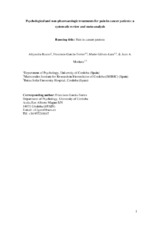Mostrar el registro sencillo del ítem
Psychological and non-pharmacologic treatments for pain in cancer patients: a systematic review and meta-analysis
| dc.contributor.author | Ruano, Alejandra | |
| dc.contributor.author | García-Torres, Francisco | |
| dc.contributor.author | Gálvez Lara, Mario | |
| dc.contributor.author | Moriana Elvira, Juan Antonio | |
| dc.date.accessioned | 2024-02-04T17:35:50Z | |
| dc.date.available | 2024-02-04T17:35:50Z | |
| dc.date.issued | 2021 | |
| dc.identifier.uri | http://hdl.handle.net/10396/27049 | |
| dc.description.abstract | Context. Pain is the most fearful symptom in cancer. Although there is a relationship between psychosocial variables and oncologic pain, psychological and non-pharmacological treatments for pain management in cancer patients are not very widespread. Objectives. To analyse the efficacy of psychological and non-pharmacological treatments for reducing pain in cancer patients. Methods. We performed a systematic review following the PRISMA protocol. In January 2021, data were extracted from PubMed, Web of Science and Scopus, including randomised controlled trials (RCT) published in the last five years (from 28th January 2015 to 15th December 2020), in the English language and whose sample was patients with cancer pain. The database search used the following keywords: cancer, cancer-related pain, psychological intervention, non-pharmacologic intervention. The Cochrane risk of bias assessment for randomised trials (RoB 2) was used for quality appraisal. Results. After the inclusion and exclusion criteria were applied, ten papers were fully screened. The evidence suggests that the most effective interventions to reduce cancer pain were mindfulness-based cognitive therapy, guided imagery and progressive muscle relaxation and emotional and symptom focused engagement (EASE). Music therapy and brief cognitive behavioural strategies (CBS) require more research, while coping skills training and yoga did not show positive effects. Overall, we obtained a moderate size effect (d = 0.642, 95% CI: 0.125 to 1.158) favourable to psychological and non-pharmacologic treatments at post-treatment, which increased at follow-up (k = 5, d = 0.826, 95% CI: 0.141 to 1.511). Conclusion. This study provides insight into psychological interventions which might be applied and contribute to cancer-related pain reduction in adults. Although the results are not completely consistent, they may shed a light on psychology applications in the oncology environment. | es_ES |
| dc.format.mimetype | application/pdf | es_ES |
| dc.language.iso | eng | es_ES |
| dc.publisher | Elsevier | es_ES |
| dc.rights | https://creativecommons.org/licenses/by-nc-nd/4.0/ | es_ES |
| dc.source | Ruano, A., García-Torres, F., Gálvez-Lara, M., & Moriana, J.A. (2022). Psychological and non-pharmacologic treatments for pain in cancer patients: a systematic review and meta-analysis. Journal of Pain and Symptom Management, 63(5), e505- e520. | es_ES |
| dc.subject | Cancer | es_ES |
| dc.subject | Pain | es_ES |
| dc.subject | Psychological treatment | es_ES |
| dc.subject | Systematic review | es_ES |
| dc.subject | Meta-analysis | es_ES |
| dc.title | Psychological and non-pharmacologic treatments for pain in cancer patients: a systematic review and meta-analysis | es_ES |
| dc.type | info:eu-repo/semantics/article | es_ES |
| dc.relation.publisherversion | https://doi.org/10.1016/j.jpainsymman.2021.12.021 | es_ES |
| dc.rights.accessRights | info:eu-repo/semantics/openAccess | es_ES |

